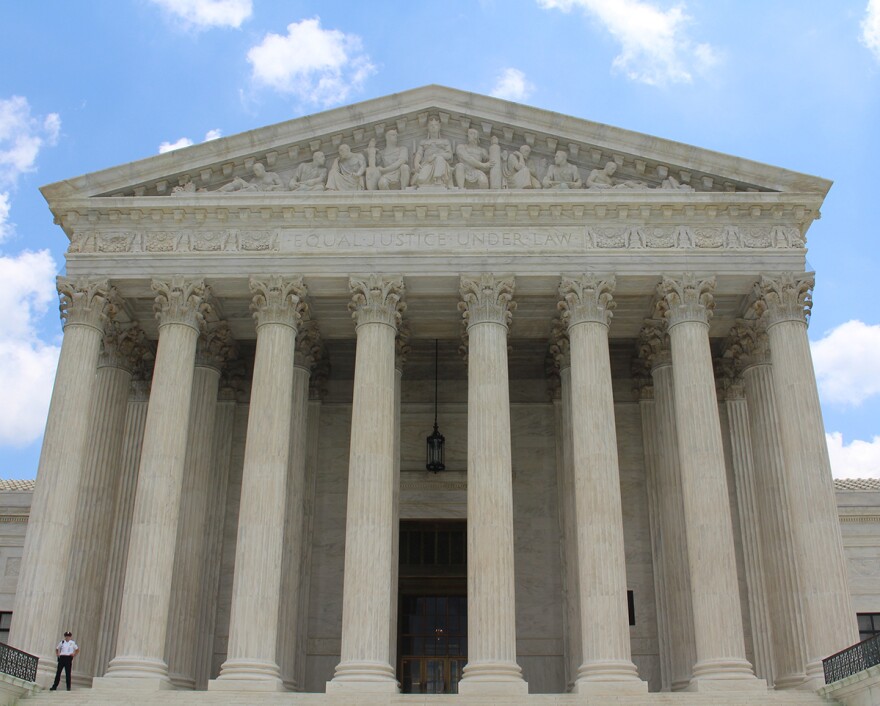Thursday morning, the U.S. Supreme Court rejected President Trump’s attempt to end Deferred Action for Childhood Arrivals, more commonly known as DACA. The program, which President Obama initiated with an executive order in 2012, provides temporary legal status to undocumented immigrants who were brought to the U.S. as children. For 8 years, DACA recipients have been allowed to obtain work permits and live without fear of deportation.
More than 14,500 DACA recipients live in Colorado.
The announcement from the Supreme Court leaves the program that protected them intact, for now.
Professor Ming Hsu Chen, an associate professor of law and the faculty director at the Immigration and Citizenship Law Center at the University of Colorado Boulder, joined KUNC’s Colorado Edition to discuss what this means for Colorado.
Interview Highlights
These interview highlights have been lightly edited for length and clarity.
Henry Zimmerman: Can you walk us through the concrete consequences of the Supreme Court ruling Thursday morning? What does tomorrow — or next month, or next year even – look like for Colorado’s DACA recipients?
Ming Hsu Chen: I think some of the most important impacts of the DACA decision are the continuation of their legal protection from deportation. That’s not a permanent and a stable status, but it allows the program, as it was created under the Obama Administration, to continue.
The other important protection from DACA is the continuation of work permits for the DACA recipients. So this decision will allow them to continue to work lawfully in the United States, earning income for themselves and in many cases for their families, who almost always include undocumented immigrants.
And that’s especially important during this time of COVID-19 when we know that so much of the COVID stimulus relief has excluded immigrants. And so being able to continue to work is critical for this group.
Some of the things that remain yet to be determined are whether or not new applications for the DACA program will be accepted by the U.S. Citizenship and Immigration Services and whether those whose original permits that last two years at a time will be automatically renewed or whether they’ll have to revisit that process.
I want to turn back to talk about Colorado. Not just the governor, Jared Polis, but also Colorado Attorney General Phil Weiser has said he will continue to defend and support the state’s Dreamers. Can you talk a little bit about the role of the state as it relates to the DACA program and the support they’re talking about?
I’m glad to see that they’ve gone on record with their support for the DACA recipients.
I think some of what they need to do as a matter of litigation is to stand ready in case the White House does decide to renew their position that they want to end this program, but there is also a lot of state measures that they could choose to support and even extend.
In Colorado we have an ASSET Bill that allows Dreamers to attend our public universities at in-state tuition. And that is a considerable savings, and that makes a difference to the prospect for Dreamers to be able to complete their higher education. The ASSET Bill remains in place, but that is of course also a political decision that would require continuing support.
There are also a lot of unsettled decisions under Colorado state law around professional licensing, for example, so that if you have a DACA receipt who is pursuing engineering or nursing or law, it is not yet clear under Colorado laws if they will automatically be able to enter their profession even after they’ve completed all the degree credentials. So that is something where attorneys in Colorado could definitely play a role in clarifying their eligibility for licensing that allows them to continue in those jobs.
I think as well, a really important issue that just popped up this week is the eligibility of Dreamers for COVID stimulus and relief funds. There, in the federal legislation, were a number of streams of funding that had been made available to workers as well as students who have a number of loans, and all of those have been excluding Dreamers so far.
In fact, one of the rules that was introduced just this week would bar colleges from being able to extend funding even if they wanted to extend those emergency funds. Now just last night there was a decision to enjoin an earlier version of that rule, but so far as I checked this morning that possibility is still there.
How about support at a level under the state, either local communities, local jurisdictions, or I also wonder about universities and how they play a role in all of this?
I think it’s important to think about those local institutions, because a lot of time they’re the ones that have the biggest impact on people’s day-to-day lives. And while the local institutions can’t actually provide a path to citizenship that only Congress can provide, there is a lot they can do that is very practical.
One example would be that in higher education, universities can continue to provide legal assistance to the Dreamers who are now eligible to keep filing their applications to renew their existing status. They can commit to continuing with some of the really creative work that’s been done to support completion of degrees. They can also continue to lobby for some of the COVID relief money, including to help with student loans, to extend to Dreamers. Right now, none of that money is going to Dreamers. And in fact just this week the Department of Education introduced a rule that would bar colleges from extending that funding even if they wanted to do so.
So continuing to press for some of those services will be really important.
This conversation is from KUNC’s Colorado Edition for June 18. You can find the full episode here.



